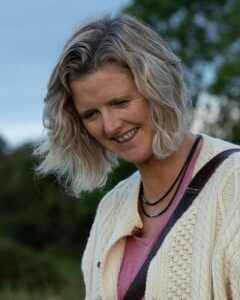Reviewed By Cara Swanston - Registered Member MBACP Adv. Dip.
Ask a Therapist: I'm Questioning my Sexuality
13 June 2023
The realisation that you may have feelings for someone of the same sex can create a whirlwind of worries.

Emma Doran
Counsellor @ uHub Therapy Centre
I've been questioning my sexuality for a while now, it's been affecting my relationships because I feel I can't be honest with friends, family or even people I have crushes on. It's been causing me a bit of anxiety because I feel like I need to "know" or be "sure". Have you any suggestions for how to navigate this?
Developing feelings for someone or getting a “crush” can be both an exciting and nerve wracking experience for anyone. Now throw in the realisation that you may have feelings for someone of the same sex, and it can create a whirlwind of worries.
When you first realise that you may not be “straight” it can be a worrying time, the fear that you aren’t what you perceive as “normal" can be unsettling. The most important thing to remember during this time is that there is no “normal” we are all wonderfully unique, and that questioning your sexuality does not mean there is anything wrong with you.
Sexuality exists on a spectrum
It can be fixed and non changing for some people, or it can be fluid for others. For some people labels are comforting, terms such as gay, lesbian, bisexual and asexual, can provide some people with a sense of identity and belonging. These terms can help put a name to the feelings you are experiencing.
For others, they may find more comfort in not putting a label on their sexuality, and both of these decisions are completely fine, it’s about finding what works best for you. You may find that for a while one label suits you and you think you’ve got it all figured out, but then later on find that this may change.
For example, you may initially identify as gay, but then later realise you are bisexual, this is completely OK and all a part of figuring things out! Some people question their sexuality a number of times throughout their life and may identify with different identities at different points.
Ways that may help you understand yourself & your sexuality:
- Self-Reflection: Take the time to explore your feelings, attractions, and experiences without judgment or pressure. Give yourself permission to question and discover your own truth.
- Educate Yourself: Learn about different sexual orientations, identities, and the LGBTQIA+ community. Understanding the diverse spectrum of human sexuality can provide valuable insights and help you find a sense of belonging.
- Seek Support: Reach out to trusted friends, family members, or supportive communities who can provide a safe and understanding space for you to share your thoughts and feelings.
- Connect Online: Engage with online communities, forums, or support groups that focus on LGBTQIA+ experiences. Connecting with others who have gone through similar journeys can provide validation and guidance.
- Professional Help: Consider seeking support from professionals or helplines that specialize in supporting the LGBTQIA+ community. They can provide guidance, offer coping strategies, and help navigate the complexities of self-discovery.
- Journaling: Write down your thoughts, experiences, and emotions related to your sexuality. Journaling can be a therapeutic way to process your feelings and gain clarity.
- Experiment: It's okay to explore your feelings and attractions in a safe and consensual manner. Allow yourself to engage in relationships or experiences that feel right to you as you navigate your own path.
- Take Your Time: Remember, there's no rush to label or define your sexuality. Give yourself the space and time you need to understand and embrace your true self. It's a personal journey, and it's unique for everyone.
- Trust Yourself: Trust your instincts and listen to your own inner voice. You are the ultimate authority on your own identity and what feels authentic to you.
- Be Kind to Yourself: Remember that questioning your sexuality is a natural part of self-discovery. Treat yourself with kindness, compassion, and patience. You are deserving of love and acceptance, both from others and from yourself.
Things to remember:
- There’s no such thing as normal!
- The Q with LGBTQIA+ stands for "Queer" and "Questioning" so you have every right to be part of that community if you want to.
- Questioning your sexuality doesn’t have to be a scary experience, it can be fun and full of joy too! Learning who you are and who you’re attracted to can be exciting.
Where can I go for support?
There are a number of organisations in Northern Ireland that offer support services to those in the LGBTQ+ Community. These organisations can offer services such as support groups, counselling, training and sexual health advice. Be sure to browse all the LGBTQIA+ organisations to find the best fit for you. You can also check out the LGBTQIA+ resources or browse our Helplines too!
Get Inspired Further
coming out when married
Waking up to who I really was, finding my own true self and more importantly - accepting my own true self, was one of the biggest pieces of work I've ever taken on. It’s also one of my proudest achievements.
Supporting Someone - Coming Out
When they come out, be the rock they need. Learn the dos and don'ts of providing love, acceptance, and understanding.
coming out experience
Guest blogger, Ronan Hamiliton, shares their coming out experience and how it meant learning who their close friends are.



